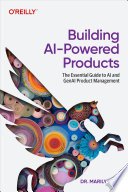Building AI-Powered Products by Marily Nika — Book Review
In an era where artificial intelligence is rapidly transforming the landscape of technological innovation, the question isn’t just how we build AI but why we build it the way we do. This is the central theme of Marily Nika’s “Building AI-Powered Products,” a book that serves as both a roadmap and a reflective mirror for those venturing into the AI domain. It’s a book that doesn’t just ask us to consider AI’s potential but also challenges us to think about its implications, much like how we once pondered the potential of the internet or the smartphone.
“Building AI-Powered Products” exudes a vibe that is both instructive and engaging, a blend of technical insight and philosophical inquiry. From the first chapter, Nika sets a tone that is approachable yet authoritative, much like a seasoned mentor guiding you through a labyrinthine journey. The pacing is deliberate, ensuring that complex concepts are unpacked with clarity and precision. This approach makes it accessible not only to AI practitioners and tech enthusiasts but also to business leaders and policymakers seeking to understand AI’s role in product innovation. The ideal target audience is broad, encompassing anyone with a curiosity about AI, from the technically proficient to the merely intrigued.
At its core, the book delves into the intricate process of developing AI-powered products, presenting a framework that balances technical rigor with strategic foresight. Nika argues that the key to successful AI products lies not just in the algorithms but in understanding user needs, ethical considerations, and the broader societal impact. She highlights the importance of interdisciplinary collaboration, advocating for a synergy between engineers, designers, and ethicists. This holistic approach is underscored by real-world examples that illuminate the challenges and triumphs of AI development.
Nika also tackles the often-overlooked aspects of AI product development such as data governance, model interpretability, and user trust. These are not mere technical hurdles but pivotal elements that define the success or failure of an AI product. Through a series of case studies, she illustrates how companies have navigated these challenges, offering insights into best practices and cautionary tales.
In the broader context, “Building AI-Powered Products” resonates with current conversations around AI ethics, privacy, and the democratization of technology. The book’s publication comes at a time when AI is frequently in the headlines—whether it’s about breakthroughs in natural language processing or debates over facial recognition technology. Nika’s insights are timely, providing a thoughtful perspective on how businesses and developers can create AI products that are not only innovative but also responsible and inclusive.
The book also draws parallels to other seminal works in the technology space, such as “The Lean Startup” by Eric Ries, in its emphasis on iterative development and user feedback. Yet, it stands apart by marrying these principles with a deep dive into AI-specific challenges and opportunities. Nika’s ability to weave together technical acumen with strategic foresight makes this book a unique contribution to the field.
On a personal level, reading “Building AI-Powered Products” has been an eye-opener. It has prompted me to reconsider how I perceive AI—not just as a set of technologies but as a catalyst for change that requires a thoughtful and ethical approach. Nika’s discussion on the importance of building user trust and ensuring transparency has been particularly impactful, prompting me to think more critically about the products I use daily and the data I share.
In conclusion, “Building AI-Powered Products” is more than just a guide for developers and tech companies; it’s a call to action for anyone interested in the future of technology. Nika’s articulate and insightful exploration makes it a must-read for those who want to understand not only how to build AI products but why we must build them with care and responsibility. This book will benefit developers, entrepreneurs, and decision-makers who aspire to harness AI’s potential while navigating its complexities and ethical dimensions. As we stand on the precipice of a new technological era, Marily Nika’s work is an invaluable resource for charting a course that is both innovative and conscientious.

Building AI-Powered Products
Author: Marily Nika
Publisher: O'Reilly Media, Inc.
Published: February 15, 2025
Get the book